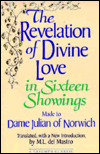A note
Note. The Great Anglican Books list to the left is very diverse.
Some works are very long, some very short, and some inbetween. Some are readily available and some are obscure.
Generally speaking, you should aim to read 300 or 400 pages. But with a densely written book, such as those by Hooker or Ussher, it would be better to read less but understand it well. Similarly, with a highly accessible work, such as the Barchester Chronicles, it would be better to read more.
If you choose a very long work, you may skip sections; please indicate in your essay what you have read and what you haven't. If you choose a short work, you should do one of the following: (a) read other works by the same author; (b) read one or more other works on the "Great Books" list, choosing works which can be connected in some way in your reflection; or (c) read commentaries on your chosen work or discussions or biographies of the author.
For TXJ 2601HF, Fall 2003
Fifth century
Patrick, Confession
Sixth and seventh centuries
Augustine of Canterbury, Correspondence with Pope Gregory preserved in
Bede, H.E., i. 23–32
Eighth century
Venerable Bede, Historia ecclesiastica gentis anglorum (usually abbreviated
H.E.)
Tenth century
Regularis concordia (E.T. by T.H.B. Symons)
Eleventh century
Anselm of Canterbury, Cur deus homo
------------------------------, Proslogion
Twelfth century
Fourteen different authors, Life of Thomas Becket (some on the Internet;
selected sources in Michael Staunton, ed. The Lives of Thomas Becket,
Manchester U.P., 2001)
 Fourteenth
century
Fourteenth
century
John Wyclif, treatises (Influential ones include De civili dominio; de
veritate sacrae scripturae, de ecclesia, de eucharistia)
Julian of Norwich, The Sixteen Revelations of Divine Love
Fifteenth century
Margery Kempe, The Book of Margery Kempe
Sixteenth century
Book of Common Prayer 1549
Book of Common Prayer 1552
 John Foxe,
Acts and Monuments
John Foxe,
Acts and Monuments
Homilies (Edward VI), esp. Homily on Prayer and Homily on Salvation
Richard Hooker, On the Laws of Ecclesiastical Polity
Richard Hooker, Discourse on Justification
John Jewel, Apologia ecclesiae anglicanae
Thomas More, Utopia
Thirty-Nine Articles
Seventeenth century
Lancelot Andrewes, Preces privatae
John Donne, Holy Sonnets
George Herbert, A Priest to the Temple; or the Country Parson
---------------------, The Temple
Lucy Hutchinson On the principles of Christian religion addressed to her
daughter; On theology
Jeremy Taylor, The Rule and Exercise of Holy Living
-------------------, The Rule and Exercise of Holy Dying
-------------------, The Liberty of Prophesying
James Ussher, The Original of Bishops
Westminster Confession
Eighteenth century
Joseph Butler, Analogy of Religion
Absalom Jones, A narrative of the proceedings of the black people, during
the late awful calamity in Philadelphia, in the year 1793
William Law, A Serious Call to a Devout and Holy Life
Hannah More, Practical Piety
John Newton and William Cowper, Olney Hymns
John Newton, Journal of a Slave-Trader
Charles Simeon, The Offices of the Holy Spirit
John Wesley, Journal, vol. 1
Susannah Wesley, Works
William White, The Case of the Episcopal Churches in the United States
Considered (Not available for Assignment 1)
William Wilberforce, Practical View of the Prevailing Religious System
of Professed Christians
Nineteenth century
Phillips Brooks, Seeking Life and Other Sermons
Samuel Ajayi Crowther Journals of the Rev. James Frederick Schön
and Mr. Samuel Crowther who, with the sanction of Her Majesty's government,
accompanied the expedition up the Niger in 1841, on behalf of the Church
Missionary Society
William Porcher DuBose, High Priesthood and Sacrifice
Essays and Reviews
John Keble, The Christian Year
Joseph Lightfoot, Philippians
F.D. Maurice, The Kingdom of Christ
William Meade, Reasons for Loving the Episcopal Church
Lux mundi
John Henry Newman, Parochial and Plain Sermons
----------------------------, Apologia pro vita sua
Florence Nightingale, Collected Works (Wilfrid Laurier Press), vols. 2,
3, 4
John Strachan, Sermon on the death of Bishop Mountain (Not available for
Assignment 1)
Tracts for the Times
Anthony Trollope, "The Barchester Chronicles" (several volumes)
Charlotte Mary Yonge, The Heir of Redclyffe
 Twentieth
century
Twentieth
century
Edward Ahenakew, Voices of the Plains Cree
Roland Allen Missionary Methods: St. Paul's or ours?
Charles Henry Brent, That They All May Be One (posthumous)
Philip Carrington, The Meaning of Revelation
T.S. Eliot, For Lancelot Andrewes
Charles Gore, The Reconstruction of Belief
C.S. Lewis, Screwtape Letters
C.S. Lewis, Surprised by Joy
Arthur Michael Ramsey, The Gospel and the Catholic Church
Dorothy L. Sayers, The Mind of the Maker
Stephen Sykes, The Integrity of Anglicanism
William Temple, Nature, Man, and God
----------------------, Christianity and Social Order
Desmond Tutu, Hope and Suffering: Sermons and Speeches
Evelyn Uunderhill, Mysticism
---------------------,Worship